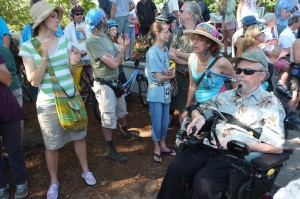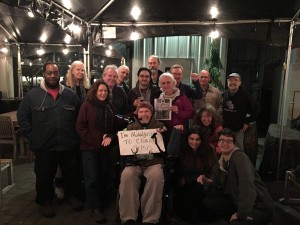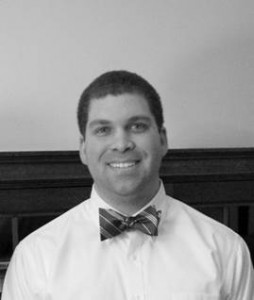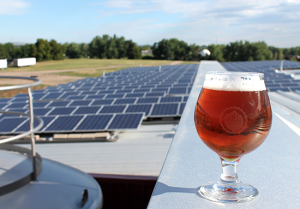
Sunday, September 21st, 2014, Eugene, Oregon, Debra and David (on right) beginning to march against global warming in solidarity with the event in New York City.
For four decades I have been an activist challenging the mental health industry. More and more I feel that the climate crisis should be one of the highest priorities for social change led by people who have personally experienced psychiatric abuse, and our allies. I affectionately call us The Mad Movement. It seems that almost every speaker against global warming ends their message the same way, that we can stop this catastrophe if society has the “will.” I believe that participants in The Mad Movement have an important insight into real sickness in society. As a psychiatric survivor, I have seen too much labeling of creative maladjustment as ill. We need to shake off our world’s complacency and numbness, also known as “normality.”
The beginning of 2015 marks the fifth anniversary of a little-known campaign by the well-respected environmental group 350.org that asks the approximately 7,000 local chambers of commerce in the USA to oppose the way the U.S. Chamber of Commerce, based in Washington, D.C., blocks national progress in the fight to stop global warming. 350 says that, “The Chamber has long opposed environmental standards, but on climate change, they’ve gone pretty near berserk” (www.chamber.350.org).
350’s main request of local chambers seems pretty modest — to simply issue a statement saying that the US Chamber “doesn’t speak for us” in its denial of human-caused climate change. Unfortunately, despite five years of effort by activists, only 56 local chambers have distanced themselves from the U.S. Chamber about global warming. That is less than one percent! I have helped organize many actions over the past five years to ask our local Eugene Area Chamber of Commerce to say anything about climate change, but regrettably we have been met by a wall of silence.
We have tried everything from writing letters to the editor, personally corresponding with board members, performing public street theater, and protesting inside the chamber office itself. And still, no substantial moves have been made. The Eugene Area Chamber’s board members relentlessly refuse to speak up for values that they profess to have.
I am extremely concerned about the disaster of climate change because I think of it as a one-two punch. The first punch is highly predictable and linear. Almost all scientists agree on this “unequivocal” punch. The Intergovernmental Panel on Climate Change spotlights the certainty of human-caused global warming hazards, such as sea-level rise. I am more interested in the second, surprise punch of runaway climate change, which is non-linear.
There has been a quiet revolution throughout the sciences that I like to call “the butterfly effect.” Others call this field the science of emergence, chaos, dynamic systems, or complexity. In short, when complex systems like Earth’s environment are disrupted, chaotic results can occur. Global warming may trigger amplifying, abrupt feedback effects, such as methane release as a result of warming permafrost. A little global warming may lead to an irreversible avalanche of extreme global warming. I call the worst case scenario of climate change “Normalgeddon.”
Right now, the Eugene chapter of 350.org is focusing on valuable state-wide campaigns such as blocking oil pipelines, divesting the University of Oregon Foundation from companies that profit from fossil fuels, and carbon-restrictive legislation. These campaigns are necessary, and we should rally for more support for these local efforts. We should also still support 350.org’s national campaign to get local chambers to speak out against the U.S. Chamber of Commerce.
The Eugene Area Chamber of Commerce president has always been responsive and civil to me personally, but he has also refused to speak out against the U.S. Chamber. He claims that the Eugene chamber is entirely independent. In a way, the Eugene community should see the Eugene Area Chamber’s refusal to speak up as a gift, because the climate crisis is no longer a faceless entity — it is embodied by our local chamber’s refusal to demand real change. Our chamber is also an actual place to peacefully protest. The chamber’s office is downtown at the corner of 14th and Willamette.
The planet’s issues are the people’s issues. Those of us who are the most marginalized and disenfranchised by existing inequality are the most vulnerable to impacts of the changing climate. All organizations fighting for people must fight for the planet, and vice versa. As a mental health and disability rights activist, connecting the issues of mental health and climate change are particularly important to me, but this work can and must be done in all realms. Please take up the leadership to nonviolently urge that the Eugene Area Chamber of Commerce, and its leaders, speak up about the U.S. Chamber and climate crisis.
After my wonderful wife Debra and I came home from last year’s climate march here in Eugene in solidarity with a huge New York City march, we turned to each other realizing that we had the exact same take-away message: Hope means acting from your own highest principles, without necessarily knowing what the outcome will be. I hope that the Eugene community and the board members of the Eugene Area Chamber of Commerce will think this through, and act on their own highest principles. After all, real mental well-being requires that we work now with a sense of urgency, unity, purpose and hope. Not only do we need a climate miracle, we need to construct our own miracle in our minds and in our communities.
———-
For more information see the David W. Oaks blog at www.normalgeddon.com.
Read More






